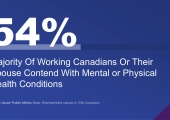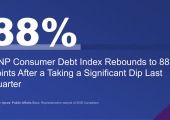MNP Debt Index Declines Significantly as Canadians Deal with Rising Rates and Affordability Pressures
Canadians are Regretting the Amount of Debt they Have and are Concerned about Future Finances
Toronto, ON, July 10, 2023 — The quarterly MNP Debt Index has declined to 83 points, down 6 points this quarter after rebounding from the all-time low a half-year ago. Canadians are continuing to feel negatively about their personal finances and managing their debt as the cost of living continues to be a prominent issue for most Canadians. With interest rates subsequently moving up again, it’s likely that Canadians are feeling increasingly uncertain about the direction of their economic future.
Insolvency Rates at All Time High
More than half (52%, +6) of Canadians report that they are $200 away or less from not being able to meet all of their financial obligations, including a third (35%, +5) who say they already don’t make enough to cover their bills and debt payments, the highest recorded proportion to date. While insolvency rates climb, the average amount of money that Canadians have left over at the end of the month has dropped slightly to $771, down $16 from the previous quarter.
Women (-$110), Canadians aged 55+ (-$73) and those with a household income of $60K to less than $100K (-$208) saw a decrease in month-end finances. Notably, this decline has widened the gap between the average month-end finances of men ($985) and women ($570) and between those aged 18-34 ($859) and 55+ ($777).
Canadians are More Concerned with Debt
Canadians’ net personal debt rating has declined to 17 points, a seven-point decrease from last quarter. The shift is a result of fewer Canadians rating their personal debt situation as ‘excellent’ (36%, -4) and fewer are rating it as terrible (19%, +3).
When Canadians were asked about their current debt situation compared to one year ago, a quarter perceive their current debt situation to be better (24%, -1). In addition, more Canadians have rated their current debt situation as much worse compared to a year ago, a increase of 3 points from the previous quarter (18%). Canadians were asked to forecast their expected debt situation year from now, 3 in 10 Canadians expect their debt situation to be better (30%, -1) and more believe it will worsen (15%, +2).
Moreover, half of Canadians now say they regret the amount of debt they’ve taken on in life (52%, +9), the highest proportion recorded to date. Furthermore, more Canadians are concerned about their current level of debt (48%, +2) than before. Those most likely to regret the amount of debt they’ve taken on are likely to be from Atlantic Canada (57%, +10) or Alberta (56%, +16) and among Millennials (61%, +6).
Interest Rates Remain a Prominent Issue
Canadians are still pessimistic about their ability to absorb interest rates increases. When asked their ability to absorb an interest rate increase of 1 percentage point, a fifth (22%, -2) say they are much better equipped to absorb this increase, while more (23%, +2) say their ability to deal with this increase has worsened. The question was rephrased to ask their ability to absorb an interest rate increase of an extra $130, in which a fifth (19%, -2) say their ability to absorb this increase is much better, while a third (32%, +2) say it is much worse.
Canadians were asked to reflect on their personal finances amidst increasing interest rates. Notably, more Canadians say they are more concerned about their ability to pay their debts (66%, +6) than the previous quarter. In addition, more Canadians say they’re already beginning to feel the effects of interest rate increase (69%, +4) and more will be careful with how they spend their money (86%, +3). As concern with interest rate hikes are rising, about 3 in 5 Canadians say that if interest rates go up much more, they will be in financial trouble (63%, +6).
Consistent with last quarter, women and Canadians ages 35-54 are most likely to agree they will be more careful with how they spend their money due to rising interest rates. Canadians with less than $40K household income and those ages 18-34 and 35-54 are most likely to feel the effects of interest rate increases, concerned with their ability to repay their debts, will be in financial trouble, and fear that rising interest rates moving them close towards bankruptcy.
Canadians Struggling With Affordability and Rising Cost of Living
The rising cost of living continues to adversely affect the affordability of many essentials for Canadians. Among a list of everyday essentials, perceptions have slightly improved but over half Canadians has noted that feeding themselves and their family (52%, -5) and putting money aside for savings (54%, -4) is less affordable, while about half say that transportation (44%, -6), clothing or other household necessities (48%, -3), and housing (45%, unchanged) is less affordable.
When Canadians were asked how much more they feel they are spending on essentials on a weekly basis compared to a year ago, a quarter of Canadians have noted their weekly expenses have increased by less than $100 (23%) or in between $100 and less than $200 (27%). Notably, Canadians who are already insolvent are just as likely to say their weekly expenses has increased as the total population. On average, Canadians say they are spending $230 more weekly on necessities, higher among men ($240), those aged 18-34 ($272) and those with $100K+ household income ($310).
About the Study
These are some of the findings of an Ipsos poll conducted between June 1-6 2023, on behalf of MNP LTD. For this survey, a sample of 2,000 Canadians aged 18 years and over was interviewed. Weighting was then employed to balance demographics to ensure that the sample's composition reflects that of the adult population according to Census data and to provide results intended to approximate the sample universe. The precision of Ipsos online polls is measured using a credibility interval. In this case, the poll is accurate to within ±2.5 percentage points, 19 times out of 20, had all Canadian adults been polled. The credibility interval will be wider among subsets of the population. All sample surveys and polls may be subject to other sources of error, including, but not limited to coverage error, and measurement error.
For more information about the MNP Consumer Debt Index, please visit mnpdebt.ca/CDI.
For more information on this news release, please contact:
Sean Simpson
Senior Vice President, Canada, Public Affairs
[email protected]
Raymond Vuong
Account Manager, Canada, Public Affairs
[email protected]
About Ipsos
Ipsos is the world’s third largest market research company, present in 90 markets and employing more than 18,000 people.
Our passionately curious research professionals, analysts and scientists have built unique multi-specialist capabilities that provide true understanding and powerful insights into the actions, opinions and motivations of citizens, consumers, patients, customers or employees. We serve more than 5000 clients across the world with 75 business solutions.
Founded in France in 1975, Ipsos is listed on the Euronext Paris since July 1st, 1999. The company is part of the SBF 120 and the Mid-60 index and is eligible for the Deferred Settlement Service (SRD).
ISIN code FR0000073298, Reuters ISOS.PA, Bloomberg IPS:FP www.ipsos.com
More insights about Financial Services


![[WEBINAR] Ipsos Global Trends 2025: Canadian Edition](/sites/default/files/styles/related_more_insights/public/ct/event/2025-08/thumbnail-templates_5.png?itok=hLtbMkre)

![[WEBINAR] Short-Form Social Misfits: Cracking the Code of Creative Excellence](/sites/default/files/styles/related_more_insights/public/ct/event/2025-08/thumbnail_0_10.jpg?itok=-V2lZWdx)